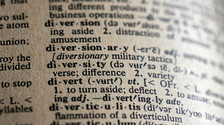azahrah.qolbaina
what the things that make verb 2 and verb 3 different
I was confised by verb 2 and verb 3. Can you explain it?
16 mar 2012 11:16
Risposte · 3
What is verb 1?
16 marzo 2012
It sounds like you're asking about patterns like "see - saw - seen", or (Brad's example) "go - went - gone".
Basically, the past participle ("verb 3") always needs a helping verb. Always. It can't function without one. So you can say "I have seen" or "it is gone", but "it gone" and "I seen" are completely wrong; you need "it went" and "I saw" (simple past) in these cases.
You use the past participle in perfect tenses (I have seen; I had eaten; I will have spoken), hypothetical forms using "have" (I should have known; it could have sunk), or passive forms (it is known; that was eaten).
Verb 2 (past simple) is the basic past tense of the verb.
16 marzo 2012
Are you talking about the simple past (e.g., "went") vs. the past participle (e.g., "gone")?
16 marzo 2012
Non hai ancora trovato le tue risposte?
Scrivi le tue domande e lascia che i madrelingua ti aiutino!
azahrah.qolbaina
Competenze linguistiche
Arabo, Inglese, Indonesiano, Turco
Lingua di apprendimento
Arabo, Inglese, Turco
Altri articoli che potrebbero piacerti

Top 6 Mistakes to Avoid with Vocabulary Acquisition
38 consensi · 10 Commenti

Navigating Your First Job: Do's and Don'ts in the Workplace
47 consensi · 21 Commenti

What Content to Watch to Acquire Advanced-level Proficiency
79 consensi · 50 Commenti
Altri articoli
